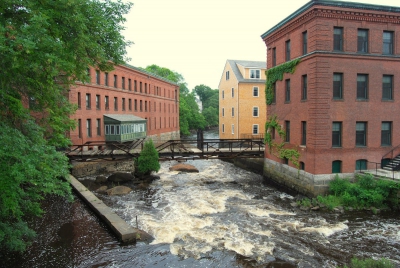John Winthrop (January 12, 1587/88 March 26, 1649) was an English Puritan lawyer and one of the leading figures in founding the Massachusetts Bay Colony, the second major settlement in New England following Plymouth Colony. Winthrop led the first large wave of colonists from England in 1630 and served as governor for 12 of the colony's first 20 years. His writings and vision of the colony as a Puritan "city upon a hill" dominated New England colonial development, influencing the governments and religions of neighboring colonies.
Winthrop was born into a wealthy land-owning and merchant family. He trained in the law and became Lord of the Manor at Groton in Suffolk. He was not involved in founding the Massachusetts Bay Company in 1628, but he became involved in 1629 when anti-Puritan King Charles I began a crackdown on Nonconformist religious thought. In October 1629, he was elected governor of the Massachusetts Bay Colony, and he led a group of colonists to the New World in April 1630, founding a number of communities on the shores of Massachusetts Bay and the Charles River.
Between 1629 and his death in 1649, he served 18 annual terms as governor or lieutenant-governor and was a force of comparative moderation in the religiously conservative colony, clashing with the more conservative Thomas Dudley and the more liberal Roger Williams and Henry Vane. Winthrop was a respected political figure, and his attitude toward governance seems authoritarian to modern sensibilities. He resisted attempts to widen voting and other civil rights beyond a narrow class of religiously approved individuals, opposed attempts to codify a body of laws that the colonial magistrates would be bound by, and also opposed unconstrained democracy, calling it "the meanest and worst of all forms of government". The authoritarian and religiously conservative nature of Massachusetts rule was influential in the formation of neighboring colonies, which were formed in some instances by individuals and groups opposed to the rule of the Massachusetts elders.
Winthrop's son John was one of the founders of the Connecticut Colony, and Winthrop himself wrote one of the leading historical accounts of the early colonial period. His long list of descendants includes famous Americans, and his writings continue to influence politicians today.
Dorchester (colloquially referred to as Dot) is a Boston neighborhood comprising more than 6 square miles (16 km2) in the City of Boston, Massachusetts, United States. Originally, Dorchester was a separate town, founded by Puritans who emigrated in 1630 from Dorchester, Dorset, England, to the Massachusetts Bay Colony. This dissolved municipality, Boston's largest neighborhood by far, is often divided by city planners in order to create two planning areas roughly equivalent in size and population to other Boston neighborhoods.
The neighborhood is named after the town of Dorchester in the English county of Dorset, from which Puritans emigrated on the ship Mary and John, among others.Founded in 1630, just a few months before the founding of the city of Boston, Dorchester now covers a geographic area approximately equivalent to nearby Cambridge. It was still a primarily rural town and had a population of 12,000 when it was annexed to Boston in 1870. Railroad and streetcar lines brought rapid growth, increasing the population to 150,000 by 1920. In the 2010 United States Census, the neighborhood's population was 92,115.
The Dorchester neighborhood has a very diverse population, which includes a large concentration of African Americans, European Americans (particularly those of Irish, German, and Polish origin), Caribbean Americans, Latinos, and East and Southeast Asian Americans. Dorchester also has a significant LGBT population, with active political groups and the largest concentration of same-sex couples in Boston after the South End and Jamaica Plain. Most of the people over the age of 25 have completed high school or obtained a GED.

1631May, 18
In Dorchester, Massachusetts, John Winthrop takes the oath of office and becomes the first Governor of Massachusetts.
Choose Another Date
Events on 1631
- 25Feb
Cardinal Richelieu
François de Bassompierre, a French courtier, is arrested on Richelieu's orders. - 18May
John Winthrop
In Dorchester, Massachusetts, John Winthrop takes the oath of office and becomes the first Governor of Massachusetts. - 20May
Sack of Magdeburg
The city of Magdeburg in Germany is seized by forces of the Holy Roman Empire and most of its inhabitants massacred, in one of the bloodiest incidents of the Thirty Years' War. - 17Jun
Taj Mahal
Mumtaz Mahal dies during childbirth. Her husband, Mughal emperor Shah Jahan I, will spend the next 17 years building her mausoleum, the Taj Mahal. - 20Jun
Baltimore, County Cork
The sack of Baltimore: The Irish village of Baltimore is attacked by Algerian pirates.

 English
English  español
español  français
français  português
português  русский
русский  العربية
العربية  简体中文
简体中文 